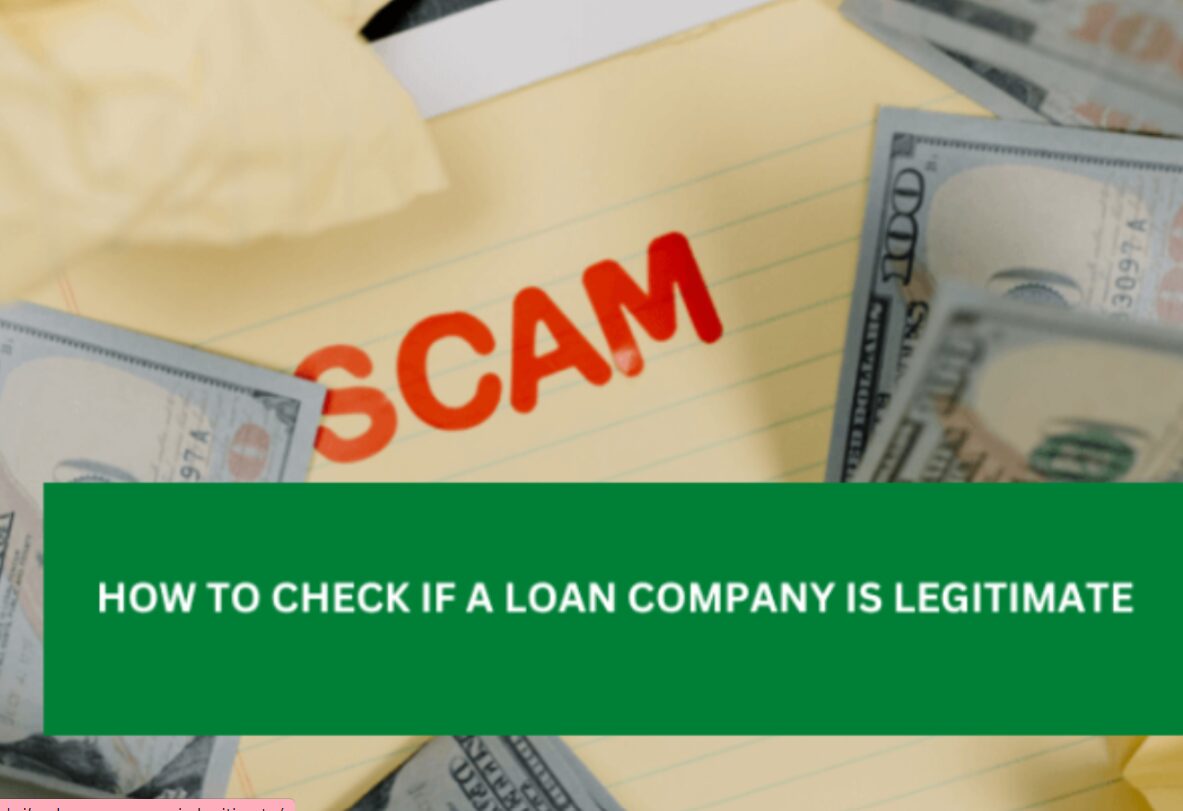Avoiding Scams: How Do You Find a Legit Loan Company?
When searching for a reputable loan company, verify their licensing, accreditations, Better Business Bureau (BBB) rating, online reviews, business longevity, and lending track record.
These steps can help confirm a company’s legitimacy before committing to a loan.
In times of urgent financial need, there are various borrowing options available.
However, it’s essential to be wary of increasing loan scams. Recent statistics show that about 44% of consumers aged 20 to 29 fall victim to fraud!
To protect your personal information, it’s crucial to verify the legitimacy of a loan company before applying for emergency funds.
An infographic how do you find a legit loan company
What Are the Warning Signs of a Business Loan Scam?
Here are red flags that indicate you might be dealing with a loan scammer instead of a legitimate lender:

- Upfront Payment Requirement: Scammers might demand payment before you receive your loan funds. Legitimate loans may have upfront fees like a commercial mortgage appraisal, but scammers often use these fees to steal your money. They typically ask for payment via untraceable methods like wire transfers or prepaid cards.
- Insecure Requests for Personal Information: While legitimate loan applications may ask for your Social Security Number (SSN) for a credit check or an Employer Identification Number (EIN) or Taxpayer Identification Number (TIN) for a business check, it’s crucial to ensure you’re dealing with a reputable company using a secure website.
- Guaranteed Approval Regardless of Credit: Scammers often claim you are approved for a loan even with bad credit and without meeting standard qualifications. Most lenders have basic creditworthiness requirements, and while there are options for those with poor credit, they usually come with higher costs.
- Unrealistic Loan Terms for New or Struggling Businesses: Legitimate business loans typically require strong revenues, at least 1-2 years in business, and good credit. It is likely a scam if someone promises financing at very low-interest rates regardless of your qualifications.
How to Check If a Loan Company Is Legitimate
To verify the legitimacy of a loan company, start by checking the Better Business Bureau (BBB) website for ratings and any complaints.
Then, do an online search for reviews from independent sources like Trustpilot.
Additionally, contact your state’s attorney general to inquire about complaints or the company’s registration status. These steps can help you avoid potential scams when applying for a loan.
They include the following:
- Verify Online Presence: Before engaging with an online lender, search for the company online, including checking the “news” tab in Google for mentions. Be cautious if the company contacts you first, as scammers often impersonate legitimate businesses. Check the website’s domain registration date for signs of a new or suspicious site. Legitimate loan brokers and companies should display their license information on their websites. Ensure the website is secure by looking for a padlock in the URL.
- Watch for Phishing Signs: Be wary of emails with misspelled words or generic email addresses like @gmail.com, as these could be phishing attempts.
- Research the Business Location: Look for a physical address on the website and verify it using Google Maps. Be cautious if the address leads to a residential home or an unrelated business. If only a P.O. Box is provided, conduct additional research to verify legitimacy. Perform a reverse search on the phone number provided.
- Check with the Better Business Bureau (BBB): Visit the BBB website to check the lender’s rating and read customer reviews. A good rating and positive reviews can indicate a reputable lender.
- Trust Your Gut: If a lender seems overly aggressive or manipulative, take a step back and reassess. If you feel uncomfortable, it might be a sign that something is not right.
- Consult Regulators: Contact your state’s attorney general’s office or the state attorney general’s office where the business is located to ensure the lender is registered and legitimate. The Consumer Financial Protection Bureau can also assist. Lenders and loan brokers are typically required by law to register with state agencies.
Who Is at Risk of a Loan Scam?
When you are in urgent need of financing, you become a prime target for predatory lenders and scams. Be extra cautious if you’re seeking:
- Debt Consolidation Loans: Especially if you’re falling behind on payments.
- Bad Credit Loans: Because of a poor credit history.
- Large Loans with Minimal Qualifications: Offers that seem too good to be true.
- Business Loans: Especially if you’ve been rejected by multiple lenders.
While it is possible to find legitimate loans in these situations, be vigilant to avoid scams. If an offer seems too good to be true, it probably is.
How Do I Know if a Financial Institution Is Legitimate?
Fake loan apps are a serious issue, designed to trick individuals into sharing personal information.
While these apps may be removed from app stores when discovered, scammers may reappear with new versions.
It is crucial to be cautious about the apps you download and the permissions you grant them.
You can find lists of fake loan apps from sources like TrendMicro and LinkedIn.
However, even if a suspicious app is not on these lists, it doesn’t guarantee its legitimacy. Always exercise caution.
Where Can I Report a Loan Scam?
How do you check if a lending company is legit?
To verify the legitimacy of a lender, consider these steps:
- Check for Contact Information: A legitimate lender will have their phone number, email address, and physical address readily available on their website, even if they operate online only.
- Investigate Online Reviews: Look for customer reviews on platforms like Google and Yelp. These reviews can provide valuable insights into the experience of working with the lender.
By taking these steps, you can help ensure that you’re dealing with a legitimate lender and avoid potential scams.